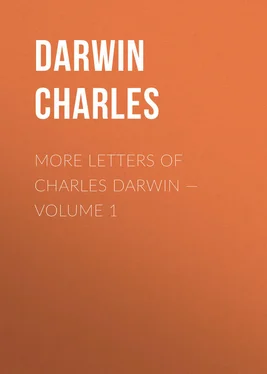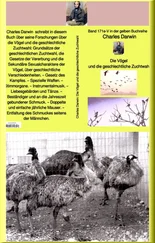Charles Darwin - More Letters of Charles Darwin — Volume 1
Здесь есть возможность читать онлайн «Charles Darwin - More Letters of Charles Darwin — Volume 1» — ознакомительный отрывок электронной книги совершенно бесплатно, а после прочтения отрывка купить полную версию. В некоторых случаях можно слушать аудио, скачать через торрент в формате fb2 и присутствует краткое содержание. Жанр: foreign_antique, foreign_prose, на английском языке. Описание произведения, (предисловие) а так же отзывы посетителей доступны на портале библиотеки ЛибКат.
- Название:More Letters of Charles Darwin — Volume 1
- Автор:
- Жанр:
- Год:неизвестен
- ISBN:нет данных
- Рейтинг книги:4 / 5. Голосов: 1
-
Избранное:Добавить в избранное
- Отзывы:
-
Ваша оценка:
- 80
- 1
- 2
- 3
- 4
- 5
More Letters of Charles Darwin — Volume 1: краткое содержание, описание и аннотация
Предлагаем к чтению аннотацию, описание, краткое содержание или предисловие (зависит от того, что написал сам автор книги «More Letters of Charles Darwin — Volume 1»). Если вы не нашли необходимую информацию о книге — напишите в комментариях, мы постараемся отыскать её.
More Letters of Charles Darwin — Volume 1 — читать онлайн ознакомительный отрывок
Ниже представлен текст книги, разбитый по страницам. Система сохранения места последней прочитанной страницы, позволяет с удобством читать онлайн бесплатно книгу «More Letters of Charles Darwin — Volume 1», без необходимости каждый раз заново искать на чём Вы остановились. Поставьте закладку, и сможете в любой момент перейти на страницу, на которой закончили чтение.
Интервал:
Закладка:
The littoral shells, according to MacAndrew, imply that Madeira and the Canaries were once joined to the mainland of Europe or Africa, but that those isles were disjoined so long ago that most of the species came in since. In short, the marine shells tell the same story as the land shells. Why do the plants of Porto Santo and Madeira agree so nearly? And why do the shells which are the same as European or African species remain quite unaltered, like the Crag species, which returned unchanged to the British seas after being expelled from them by glacial cold, when two millions (?) of years had elapsed, and after such migration to milder seas? Be so good as to explain all this in your next letter.
LETTER 48. TO J.D. HOOKER. Down, July 5th {1856}.
I write this morning in great tribulation about Tristan d'Acunha. (48/1. See "Flora Antarctica," page 216. Though Tristan d'Acunha is "only 1,000 miles distant from the Cape of Good Hope, and 3,000 from the Strait of Magalhaens, the botany of this island is far more intimately allied to that of Fuegia than Africa.") The more I reflect on your Antarctic flora the more I am astounded. You give all the facts so clearly and fully, that it is impossible to help speculating on the subject; but it drives me to despair, for I cannot gulp down your continent; and not being able to do so gives, in my eyes, the multiple creationists an awful triumph. It is a wondrous case, and how strange that A. De Candolle should have ignored it; which he certainly has, as it seems to me. I wrote Lyell a long geological letter (48/2. "Life and Letters," II., page 74.) about continents, and I have had a very long and interesting answer; but I cannot in the least gather his opinion about all your continental extensionists; and I have written again beseeching a verdict. (48/3. In the tenth edition of the "Principles," 1872, Lyell added a chapter (Chapter XLI., page 406) on insular floras and faunas in relation to the origin of species; he here (page 410) gives his reasons against Forbes as an extensionist.) I asked him to send to you my letter, for as it was well copied it would not be troublesome to read; but whether worth reading I really do not know; I have given in it the reasons which make me strongly opposed to continental extensions.
I was very glad to get your note some days ago: I wish you would think it worth while, as you intend to have the Laburnum case translated, to write to "Wien" (that unknown place) (48/4. There is a tradition that Darwin once asked Hooker where "this place Wien is, where they publish so many books."), and find out how the Laburnum has been behaving: it really ought to be known.
The Entada is a beast. (48/5. The large seeds of Entada scandens are occasionally floated across the Atlantic and cast on the shores of Europe.); I have never differed from you about the growth of a plant in a new island being a FAR harder trial than transportal, though certainly that seems hard enough. Indeed I suspect I go even further than you in this respect; but it is too long a story.
Thank you for the Aristolochia and Viscum cases: what species were they? I ask, because oddly these two very genera I have seen advanced as instances (I forget at present by whom, but by good men) in which the agency of insects was absolutely necessary for impregnation. In our British dioecious Viscum I suppose it must be necessary. Was there anything to show that the stigma was ready for pollen in these two cases? for it seems that there are many cases in which pollen is shed long before the stigma is ready. As in our Viscum, insects carry, sufficiently regularly for impregnation, pollen from flower to flower, I should think that there must be occasional crosses even in an hermaphrodite Viscum. I have never heard of bees and butterflies, only moths, producing fertile eggs without copulation.
With respect to the Ray Society, I profited so enormously by its publishing my Cirrepedia, that I cannot quite agree with you on confining it to translations; I know not how else I could possibly have published.
I have just sent in my name for 20 pounds to the Linnaean Society, but I must confess I have done it with heavy groans, whereas I daresay you gave your 20 pounds like a light-hearted gentleman...
P.S. Wollaston speaks strongly about the intermediate grade between two varieties in insects and mollusca being often rarer than the two varieties themselves. This is obviously very important for me, and not easy to explain. I believe I have had cases from you. But, if you believe in this, I wish you would give me a sentence to quote from you on this head. There must, I think, be a good deal of truth in it; otherwise there could hardly be nearly distinct varieties under any species, for we should have instead a blending series, as in brambles and willows.
LETTER 49. TO J.D. HOOKER. July 13th, 1856.
What a book a devil's chaplain might write on the clumsy, wasteful, blundering, low, and horribly cruel works of nature! With respect to crossing, from one sentence in your letter I think you misunderstand me. I am very far from believing in hybrids: only in crossing of the same species or of close varieties. These two or three last days I have been observing wheat, and have convinced myself that L. Deslongchamps is in error about impregnation taking place in closed flowers; i.e., of course, I can judge only from external appearances. By the way, R. Brown once told me that the use of the brush on stigma of grasses was unknown. Do you know its use?..
You say most truly about multiple creations and my notions. If any one case could be proved, I should be smashed; but as I am writing my book, I try to take as much pains as possible to give the strongest cases opposed to me, and often such conjectures as occur to me. I have been working your books as the richest (and vilest) mine against me; and what hard work I have had to get up your New Zealand Flora! As I have to quote you so often, I should like to refer to Muller's case of the Australian Alps. Where is it published? Is it a book? A correct reference would be enough for me, though it is wrong even to quote without looking oneself. I should like to see very much Forbes's sheets, which you refer to; but I must confess (I hardly know why) I have got rather to mistrust poor dear Forbes.
There is wonderful ill logic in his famous and admirable memoir on distribution, as it appears to me, now that I have got it up so as to give the heads in a page. Depend on it, my saying is a true one — viz. that a compiler is a great man, and an original man a commonplace man. Any fool can generalise and speculate; but oh, my heavens, to get up at second hand a New Zealand Flora, that is work...
And now I am going to beg almost as great a favour as a man can beg of another: and I ask some five or six weeks before I want the favour done, that it may appear less horrid. It is to read, but well copied out, my pages (about forty!!) on Alpine floras and faunas, Arctic and Antarctic floras and faunas, and the supposed cold mundane period. It would be really an enormous advantage to me, as I am sure otherwise to make botanical blunders. I would specify the few points on which I most want your advice. But it is quite likely that you may object on the ground that you might be publishing before me (I hope to publish in a year at furthest), so that it would hamper and bother you; and secondly you may object to the loss of time, for I daresay it would take an hour and a half to read. It certainly would be of immense advantage to me; but of course you must not think of doing it if it would interfere with your own work.
I do not consider this request in futuro as breaking my promise to give no more trouble for some time.
From Lyell's letters, he is coming round at a railway pace on the mutability of species, and authorises me to put some sentences on this head in my preface.
Читать дальшеИнтервал:
Закладка:
Похожие книги на «More Letters of Charles Darwin — Volume 1»
Представляем Вашему вниманию похожие книги на «More Letters of Charles Darwin — Volume 1» списком для выбора. Мы отобрали схожую по названию и смыслу литературу в надежде предоставить читателям больше вариантов отыскать новые, интересные, ещё непрочитанные произведения.
Обсуждение, отзывы о книге «More Letters of Charles Darwin — Volume 1» и просто собственные мнения читателей. Оставьте ваши комментарии, напишите, что Вы думаете о произведении, его смысле или главных героях. Укажите что конкретно понравилось, а что нет, и почему Вы так считаете.












